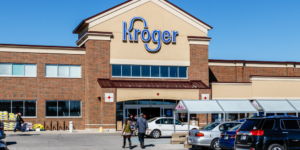
The supermarket giant Kroger is facing a host of financial problems — including one recently renovated store facing a construction lien, and allegations that the multi-billion dollar chain is eliminating stores on the West Coast rather than be forced to comply with local “hazard pay” ordinances.
The store of the center of payment contention is located in Oxford, Mississippi. Commercial and industrial concrete sub-contractor Abbey Bridges Construction Co., LLC — commonly referred to as Abbey Bridges — has filed a construction lien, also known as a mechanics lien, for unpaid checks totaling close to $175,000 for work done on the site.
According to documents obtained by Levelset, Abbey Bridges has submitted invoices totaling $621,750 — $173,695 of which they are still trying to collect. The balance consists of retainage withheld from the first seven checks, as well as the final four invoices allegedly going totally unpaid. One of these unpaid checks is valued at $72,169.
The renovated Kroger was a fifteen-month-long project that totaled $24 million. The renovations came just shy of doubling the footprint of the store, with the original Kroger occupying 55,000 square feet and the new one clocking in at 109,500 square feet. Along with an expanded pharmacy, the renovated Kroger added a Starbucks, a walk-in beer cave, and a sushi bar.
Defendant and general contractor behind the renovations, R W Smith, describes itself as “headquartered in Atlanta and operating in the Southeast, R W Smith is a financially sound general contracting firm with a stellar reputation for delivering client-focused services in a reliable and extremely knowledgeable manner.”
An independent contractor’s review of R W Smith on their contractor payment profile was not favorable. The contractor writes: “Payments not timely. Some over 90 days & never current. Would double up payments on past due but remained behind.”
The Google reviews about the renovations at the Kroger are not particularly favorable either: One reviewer, bemoaning the loss of the small-town feel after the renovations, wrote, “Since the renovation though the lines are long, the staff are never around to help, and it’s almost impossible to find a parking spot.”
The same reviewer continued, “Good night sweet prince, you will be missed. Maybe one day you will be restored.”
While the source of the payment dispute is undetermined, Kroger has the biggest headache on hand. Abbey Bridges is requesting the authorization for the sale of the property, and a special writ of execution to sell the property. Though the missed payment could have easily stemmed from R W Smith, the general contractor, ultimately a mechanics lien is an issue for the property owner. This is a result of the way a mechanics lien affects the property title.
If the missed payment did stem from R W Smith, it will be interesting to watch and see what Kroger’s next move is. At that point, Kroger’s only recourse would be to pay the bill and take them to court, or have R W Smith foot the bill with the funds that were previously distributed for the renovations.
Most recently, Abbey Bridges has filed a notice of removal. This notice of removal would move the case to a federal court, instead of being heard in the Chancery Court of Lafayette County, a state court.
Abbey Bridges, Kroger, and R W Smith did not respond to requests for comment on this story.
West Coast Kroger stores allegedly denying employees hazard pay
Kroger has also been making national news of late as well, though not for positive reasons.
Reportedly, Kroger announced the closing of three Los Angeles area stores after the city council passed a local ordinance granting hazard pay to frontline workers. The hazard pay is set to be $5 an hour for 120 days. The decision to shutter these three stores will eliminate 250 jobs.
This pattern of behavior fits that of other Kroger locations, with the supermarket chain also allegedly closing two Seattle stores after a $4-an-hour local hazard pay ordinance was passed in February 2021.
Employees of Kroger and local community members are pleading with the company to stop laying off its workers, and reducing their hours.
“The LA City Council and other elected bodies passed Hazard Pay because companies weren’t recognizing the risk their employees were taking in the pandemic. Customers fully support their grocery store workers and they also fought to raise standards for these heroes of the pandemic but instead of recognizing its employees’ hard work, Kroger is closing stores, taking away workers’ jobs and denying communities access to food,” says UFCW 770 President John Grant.
In addition to the three Los Angeles area stores set to close, Kroger will be closing 25 percent of their stores in Long Beach, and two more stores from Los Angeles in mid-May.
Grant continued, “Last year the company made $2.6 billion in profits. Whether in LA or Long Beach cities, Kroger is not closing stores because of hero pay. They are bullying workers, politicians and communities to keep us from giving these heroes a small reward, a decent living for 120 days, for their service. This is unacceptable.”